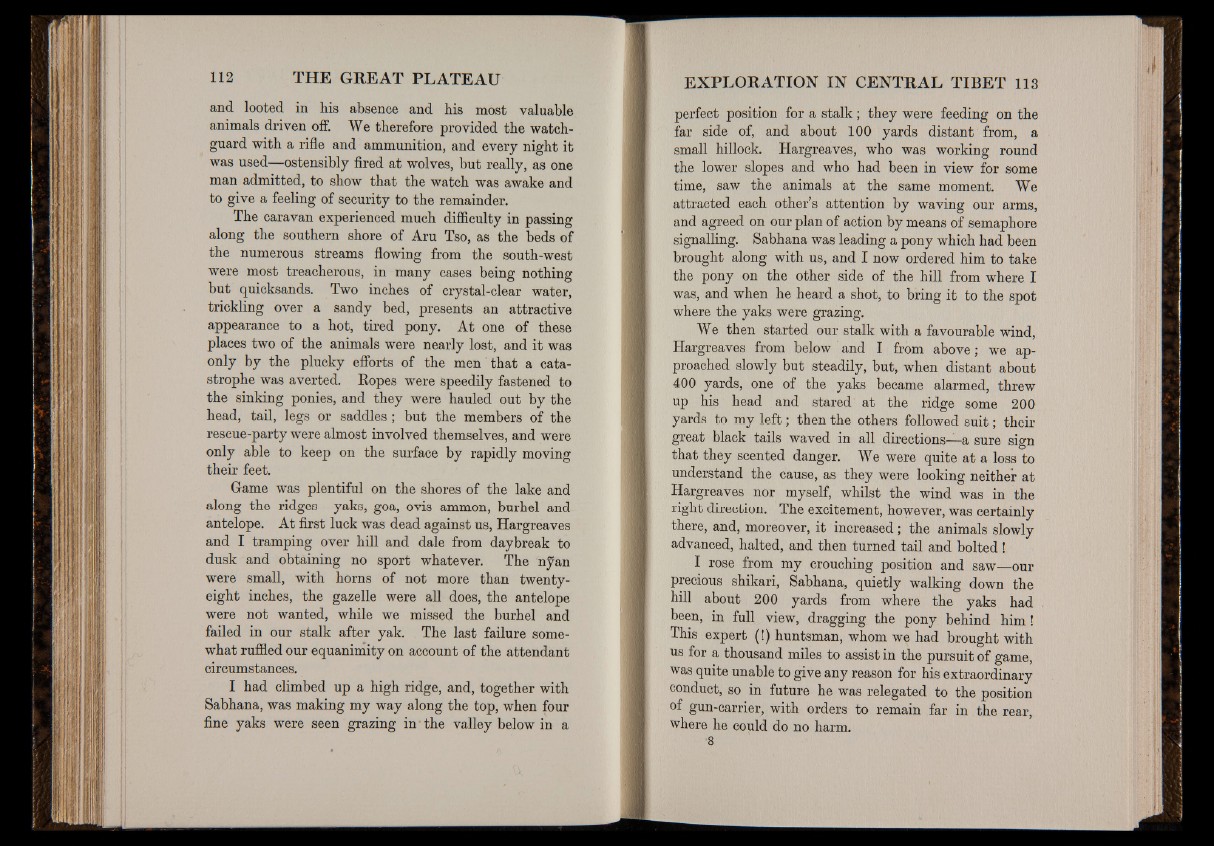
and looted in his absence and his most valuable
animals driven off. We therefore provided the watch-
guard with a rifle and ammunition, and every night it
was used—ostensibly fired at wolves, but really, as one
man admitted, to show that the watch was awake and
to give a feeling of security to the remainder.
The caravan experienced much difficulty in passing
along the southern shore of Aru Tso, as the beds of
the numerous streams flowing from the south-west
were most treacherous, in many cases being nothing
but quicksands. Two inches of crystal-clear water,
trickling over a sandy bed, presents an attractive
appearance to a hot, tired pony. At one of these
places two of the animals were nearly lost, and it was
only by the plucky efforts of the men that a catastrophe
was averted. Eopes were speedily fastened to
the sinking ponies, and they were hauled out by the
head, tail, legs or saddles ; but the members of the
rescue-party were almost involved themselves, and were
only able to keep on the surface by rapidly moving
their feet.
Game was plentiful on the shores of the lake and
along the ridges—yaks, goa, ovis ammon, burhel and
antelope. At first luck was dead against us, Hargreaves
and I tramping over hill and dale from daybreak to
dusk and obtaining no sport whatever. The nyan
were small, with horns of not more than twenty-
eight inches, the gazelle were all does, the antelope
were not wanted, while we missed the burhel and
failed in our stalk after yak. The last failure somewhat
ruffled our equanimity on account of the attendant
circumstances.
I had climbed up a high ridge, and, together with
Sabhana, was making my way along the top, when four
fine yaks were seen grazing in * the valley below in a
perfect position for a stalk; they were feeding on the
far side of, and about 100 yards distant from, a
small hillock. Hargreaves, who was working round
the lower slopes and who had been in view for some
time, saw the animals at the same moment. We
attracted each other’s attention by waving our arms,
and agreed on our plan of action by means of semaphore
signalling. Sabhana was leading a pony which had been
brought along with us, and I now ordered him to take
the pony on the other side of the hill from where I
was, and when he heard a shot, to bring it to the spot
where the yaks were grazing.
We then started our stalk with a favourable wind,
Hargreaves from below and I from above; we approached
slowly but steadily, but, when distant about
400 yards, one of the yaks became alarmed, threw
up his head and stared at the ridge some 200
yards to my le ft; then the others followed su it; their
great black tails waved in all directions—a sure sign
that they scented danger. We were quite at a loss to
understand the cause, as they were looking neither at
Hargreaves nor myself, whilst the wind was in the
right direction. The excitement, however, was certainly
there, and, moreover, it increased; the animals slowly
advanced, halted, and then turned tail and bolted !
I rose from my crouching position and saw—our
precious shikari, Sabhana, quietly walking down the
hill about 200 yards from where the yaks had
been, in full view, dragging the pony behind h im!
This expert (!) huntsman, whom we had brought with
us for a thousand miles to assist in the pursuit of game,
was quite unable to give any reason for his extraordinary
conduct, so in future he was relegated to the position
of gun-carrier, with orders to remain far in the rear,
where he could do no harm.